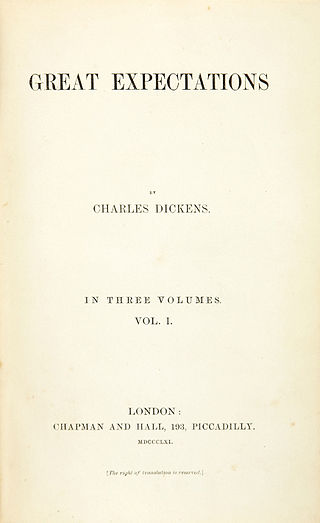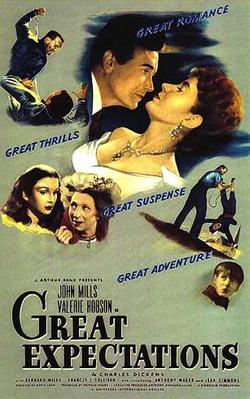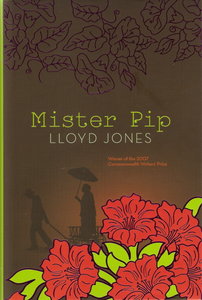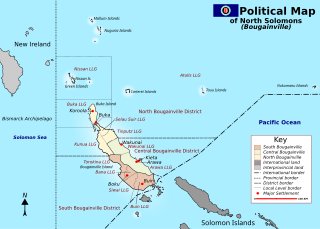
Oamaru is the largest town in North Otago, in the South Island of New Zealand, it is the main town in the Waitaki District. It is 80 kilometres (50 mi) south of Timaru and 120 kilometres (75 mi) north of Dunedin on the Pacific coast; State Highway 1 and the railway Main South Line connect it to both cities. With a population of 14,350, Oamaru is the 28th largest urban area in New Zealand, and the third largest in Otago behind Dunedin and Queenstown. The town is the seat of Waitaki District, which includes the surrounding towns of Kurow, Weston, Palmerston, and Hampden, which combined have a total population of 23,200.

Great Expectations is the thirteenth novel by English author Charles Dickens and his penultimate completed novel. The novel is a bildungsroman and depicts the education of an orphan nicknamed Pip. It is Dickens' second novel, after David Copperfield, to be fully narrated in the first person. The novel was first published as a serial in Dickens's weekly periodical All the Year Round, from 1 December 1860 to August 1861. In October 1861, Chapman & Hall published the novel in three volumes.

James Hugh Calum Laurie is an English actor, comedian, musician and writer. He first gained recognition for his work as one half of the English comedy double act Fry and Laurie with Stephen Fry.

Bougainville, officially the Autonomous Region of Bougainville, is an autonomous region in Papua New Guinea. The largest island is Bougainville Island, while the region also includes Buka Island and a number of outlying islands and atolls. The current capital is Buka, situated on Buka Island.

Bougainville Island is the main island of the Autonomous Region of Bougainville, which is part of Papua New Guinea. Its land area is 9,300 km2 (3,600 sq mi). The highest point is Mount Balbi, on the main island, at 2,715 m (8,907 ft).

Bougainville, an autonomous region of Papua New Guinea (PNG), has been inhabited by humans for at least 29,000 years, according to artefacts found in Kilu Cave on Buka Island. The region is named after Bougainville Island, the largest island of the Solomon Islands archipelago, but also contains a number of smaller islands.

Great Expectations is a 1946 British drama film directed by David Lean, based on the 1861 novel by Charles Dickens and starring John Mills and Valerie Hobson. The supporting cast included Bernard Miles, Francis L. Sullivan, Anthony Wager, Jean Simmons, Finlay Currie, Martita Hunt and Alec Guinness.
Francis Ona was the Supreme Commander of the Bougainville Revolutionary Army (BRA) during the 1988–1998 Bougainville conflict. The war began when Ona "went bush" and began organising acts of industrial sabotage against the Panguna mine, which he felt was causing environmental devastation and was not fairly compensating the traditional landowners, himself included. His followers' motives varied. The war killed thousands of Bougainvilleans.

Savage Islands is a 1983 swashbuckling adventure film set in the South Pacific in the late 19th century. Directed by Ferdinand Fairfax and filmed on location in Fiji and New Zealand, it starred Tommy Lee Jones, Michael O'Keefe and Jenny Seagrove.

Lloyd David Jones is a New Zealand author. His novel Mister Pip (2006) won the Commonwealth Writers' Prize and was shortlisted for the Booker Prize.

Mister Pip (2006) is a novel by Lloyd Jones, a New Zealand author. It is named after the chief character in, and shaped by the plot of Charles Dickens' novel Great Expectations. The novel was adapted into the film Mr. Pip in 2012.

General elections were held in the Autonomous Region of Bougainville in Papua New Guinea from 6 to 24 May 2010.

The Inspector is a 1962 CinemaScope DeLuxe Color British-American drama film directed by Philip Dunne, starring Stephen Boyd and Dolores Hart. Hart plays Lisa Held, a Dutch-Jewish girl who has survived the horror of Auschwitz concentration camp.

Great Expectations is a 2012 British-American film adaptation of Charles Dickens' 1861 novel of the same name. The film was directed by Mike Newell, with the adapted screenplay by David Nicholls, and stars Jeremy Irvine, Helena Bonham Carter, Holliday Grainger, Ralph Fiennes and Robbie Coltrane. It was distributed by Lionsgate.

The Bougainville conflict, also known as the Bougainville Civil War, was a multi-layered armed conflict fought from 1988 to 1998 in the North Solomons Province of Papua New Guinea (PNG) between PNG and the secessionist forces of the Bougainville Revolutionary Army (BRA), and between the BRA and other armed groups on Bougainville. The conflict was described by Bougainvillean President John Momis as the largest conflict in Oceania since the end of World War II in 1945, with an estimated 15,000–20,000 Bougainvilleans dead, although lower estimates place the toll at around 1,000–2,000.
The 2013 Rialto Channel New Zealand Film Awards is the second presentation for the New Zealand Film Awards, a New Zealand film industry award.

The Personal History of David Copperfield is a 2019 historical comedy-drama film written and directed by Armando Iannucci, based on the 1850 novel David Copperfield by Charles Dickens. It stars Dev Patel as the title character, along with Aneurin Barnard, Peter Capaldi, Morfydd Clark, Daisy May Cooper, Rosalind Eleazar, Hugh Laurie, Tilda Swinton, Ben Whishaw and Paul Whitehouse.

Ursula Rakova is an environmentalist and climate change activist from Papua New Guinea. In 2008 she was awarded the Pride of PNG award for her environmental contributions to the development of her country. As executive director of the not-for-profit organisation Tulele Peisa, she is responsible for organizing the relocation of the inhabitants of the Carteret Islands to the mainland of Bougainville Province. The islands are expected to be uninhabitable by 2040, rendering Rakova's people the world's first climate refugees.
Laurence Fearnley is a New Zealand short-story writer, novelist and non-fiction writer. Several of her books have been shortlisted for or have won awards, both in New Zealand and overseas, including The Hut Builder, which won the fiction category of the 2011 NZ Post Book Awards. She has also been the recipient of a number of writing awards and residencies including the Robert Burns Fellowship, the Janet Frame Memorial Award and the Artists to Antarctica Programme.
Great Expectations is a historical drama television miniseries developed by Steven Knight, based on the 1861 novel by Charles Dickens. It premiered on BBC One on 26 March 2023, followed by its US premiere on FX on Hulu later the same day.
















